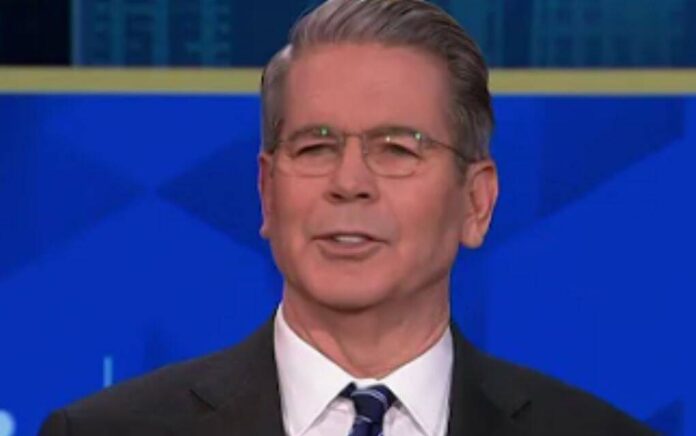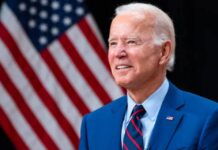
The Trump admin has been racking up win after win. And they’re not done yet.
Because the Treasury Secretary just dropped eyebrow-raising hints of what’s next on his agenda.
Treasury Department to Address Student Loan Debt After Trade and Tax Priorities
Treasury Secretary Scott Bessent announced that his department will shift its focus to tackling the student loan debt crisis once it completes its current work on trade and tax policy. Speaking on “The Charlie Kirk Show,” Bessent emphasized that while no concrete solution has been finalized, the approach will differ significantly from the debt forgiveness policies pursued by the previous administration under President Joe Biden.
President Donald Trump’s second term has prioritized negotiating new trade agreements and securing the permanence of his 2017 tax cuts, alongside fulfilling campaign promises to eliminate taxes on tips and overtime pay. Bessent highlighted the urgency of addressing the student loan issue, describing it as a critical challenge for young Americans who face financial burdens equivalent to a mortgage upon graduating college.
Bessent criticized Biden’s student loan forgiveness initiatives, particularly the blanket debt cancellation efforts, which he deemed unacceptable. Despite a 2023 Supreme Court ruling that struck down one of Biden’s forgiveness plans, the Biden administration continued to push for loan forgiveness, claiming to have canceled $74 billion in student debt for public service and government employees by October of that year.
The Treasury Department, under Bessent’s leadership, aims to develop a firm yet compassionate strategy to manage the student loan crisis. This comes as part of broader fiscal policy efforts, including Trump’s recent trade initiatives, such as imposing reciprocal tariffs on several countries starting April 2, followed by a 90-day pause to reduce most tariffs to a 10% baseline while new deals are negotiated.
On the legislative front, the House of Representatives recently passed Trump’s comprehensive tax and immigration bill, which codifies the extension of the 2017 tax cuts, eliminates taxes on tips and overtime, and increases the child tax credit to $2,200 permanently. This bill, described by Trump as “big, beautiful,” was sent to his desk for signature, marking a significant step in his administration’s fiscal agenda.
Trump Administration’s Efforts to Combat Wasteful Spending and Government Corruption
The Trump administration has made cutting wasteful spending and addressing government corruption a cornerstone of its second term, with several initiatives aimed at enhancing fiscal responsibility and transparency. One of the most prominent efforts is the creation of the Department of Government Efficiency (DOGE), led by Elon Musk and Vivek Ramaswamy, tasked with identifying and eliminating waste, fraud, and abuse across federal agencies. DOGE has already claimed to have identified billions in savings, targeting programs and contracts deemed unnecessary or misaligned with national interests.
A key focus of DOGE’s efforts has been the review and cancellation of contracts and grants from the Biden era, particularly those related to diversity, equity, and inclusion (DEI) initiatives and other projects considered ideologically driven. For instance, the administration canceled a $50 million environmental justice grant linked to an organization advocating controversial positions, as well as $124 million in Department of Energy expenditures, including DEI contracts and costly news subscriptions. These actions are part of a broader push to redirect taxpayer dollars toward priorities that directly benefit Americans.
President Trump has also signed multiple executive orders to streamline federal operations and reduce bureaucratic bloat. One such order, signed on February 19, 2025, continued the reduction of the federal bureaucracy by cutting non-statutory functions and minimizing statutory functions of agencies like the Federal Mediation and Conciliation Service and the Minority Business Development Agency. This aligns with Trump’s campaign promise to “drain the swamp” and reduce the federal government’s footprint, returning power to state and local governments.
The administration’s procurement reforms further demonstrate its commitment to fiscal discipline. On March 20, 2025, Trump signed an executive order consolidating federal procurement for common goods and services under the General Services Administration (GSA). This initiative aims to eliminate waste and duplication, potentially saving taxpayers up to $50 billion annually by reducing the $490 billion spent yearly on federal contracts. The focus on merit-based contracting contrasts with the Biden administration’s emphasis on DEI in procurement processes.
Efforts to curb wasteful spending extend to specific agency actions. The Environmental Protection Agency (EPA), inspired by DOGE, identified $20 billion in discretionary spending that the Biden administration reportedly knew was being wasted. Similarly, the Department of Defense has collaborated with DOGE to eliminate millions in DEI-related contracts, including $1.9 million for Air Force training programs and $6 million for initiatives at the University of Montana. These cuts reflect a broader shift toward prioritizing meritocracy and efficiency.
The Trump administration has also targeted foreign aid and international programs for scrutiny. The U.S. Agency for International Development (USAID) has faced significant cuts, including the elimination of $20 million allocated for a “Sesame Street” program in Iraq and other grants promoting DEI abroad. These actions, while controversial and facing legal challenges, go to show the administration’s commitment to reallocating resources away from projects deemed frivolous or ideologically motivated.
Trump’s budget proposals further illustrate his aggressive stance on reducing federal spending. The fiscal year 2026 budget blueprint, released on May 2, 2025, proposes cutting $163 billion in non-defense discretionary spending, targeting programs in child care, health research, education, and housing assistance. The budget eliminates funding for initiatives like the National Institute on Minority Health and Health Disparities and slashes the Centers for Disease Control and Prevention’s budget by nearly half, citing waste and inefficiencies.
Despite these efforts, challenges remain. Critics argue that some of the administration’s claims of fraud and corruption lack evidence of criminal activity, with many targeted programs simply reflecting differing policy priorities. For example, a February 16, 2025, PBS fact-check noted that while Trump and Musk frequently cited “fraud and abuse,” the examples provided often involved discretionary spending rather than proven illegal activity. This has sparked debates over whether the administration’s cuts are driven by fiscal responsibility or ideological differences.
The administration’s rescissions packages, which seek to claw back previously appropriated funds, are another tool in its cost-cutting arsenal. On June 2, 2025, Trump submitted a $9.4 billion rescissions package to Congress, targeting foreign aid, NPR and PBS funding, and other programs deemed wasteful. This follows a history of rescission efforts from Trump’s first term, though previous attempts faced resistance in Congress, highlighting the challenge of securing legislative approval for such measures.
While the administration’s cost-cutting initiatives have garnered support from fiscal conservatives, they have also faced opposition. Elon Musk’s abrupt departure from DOGE on May 31, 2025, and his subsequent criticism of Trump’s tax bill as a “disgusting abomination” revealed tensions within the administration over balancing tax cuts with fiscal restraint.



















